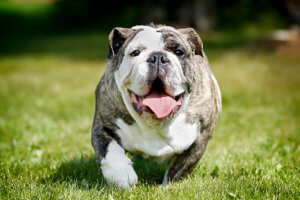Gastric dilatation-volvulus (GDV), commonly called “bloat,” is a life-threatening medical emergency that commonly affects dogs. Bloat in dogs occurs primarily in large, deep-chested breeds. Unfortunately, GDV occurs without warning and is very difficult to treat.
What is GDV?
 Gastric dilatation-volvulus, or bloat in dogs, is an acute swelling of the stomach. The stomach fills rapidly with excessive gas, which distorts and enlarges it. Since the stomach isn’t able to rid itself of the excess gas, it may twist on its axis which causes obstructions at each end of the stomach.
Gastric dilatation-volvulus, or bloat in dogs, is an acute swelling of the stomach. The stomach fills rapidly with excessive gas, which distorts and enlarges it. Since the stomach isn’t able to rid itself of the excess gas, it may twist on its axis which causes obstructions at each end of the stomach.
A dog may appear uncomfortable, pace, or salivate at this time. Some, however, show few signs; it depends on the severity and rate at which the bloating occurs.
Causes of GDV
Unfortunately, medical professionals can’t define just one thing that causes bloat in dogs. It typically occurs in large, deep-chested breeds, such as:
- Great Danes
- Collies
- Dobermans
- German Shepherds
- Boxers
However, it may also occur in smaller dogs, like Beagles and Bichons. It appears to run in hereditary lines of certain breeds. Eating or drinking too much or too fast has been thought to be a contributing factor, along with excessive exercising before dog digests its meal.
It doesn’t seem to affect one sex more than the other, but it’s more likely to occur as a dog ages. Bloat commonly occurs in dogs between the ages of 7 and 12 years.
Signs and Symptoms for Bloat in Dogs
There are many signs of bloat in dogs. The dog will seem uncomfortable and exhibit symptoms such as:
- Vomiting
- Dry Heaves
- Salivation
- Restlessness
- Distention and swelling of the abdominal cavity
- Unnatural body posture
While some of these signs may simply indicate a stomach ache, bloat in dogs is a serious medical emergency that requires immediate medical attention. A veterinary hospital will confirm the diagnosis with an abdominal x-ray. GDV causes a total collapse. The dog goes into shock and ultimately can die from cardiac irregularities.
Treatment For Bloat in Dogs
Bloat in dogs requires immediate medical attention in order to save the dog’s life. Unfortunately, according to statistics, over 50% of GVD cases will die even with veterinary attention. Treatment for shock should start in early phases, and the stomach decompressed. This may be accomplished by passing a stomach tube, but sometimes surgery will be the only option to try to save the pet.
Surgery does not guarantee a happy outcome, unfortunately, and some pets will not recover even with it.
A pet that lives through a bloating episode, but doesn’t have corrective surgery, will be at high risk for another attack. Without “tacking’’ the stomach in place, a dog will most likely bloat again.
Can the Pet Care Facility Prevent My Dog from Bloating?
Most professional pet care facilities and dog boarding kennels take precautions not to overfeed or let pets drink excessive amounts of water. If aware of a hereditary problem, special observation notes may be made. Dogs are active and receive copious exercise time well before or after meals. Even with careful precautions and diligent observation, GDV may occur.
When you leave your dog with a dog boarding facility, you and your dog deserve high-quality handling and care. At Cozy Canine Camp, we provide every pet with an attentive, individualized, and comfortable experience. Call us today at 410-923-2010 for more information about our facilities and pet services.




